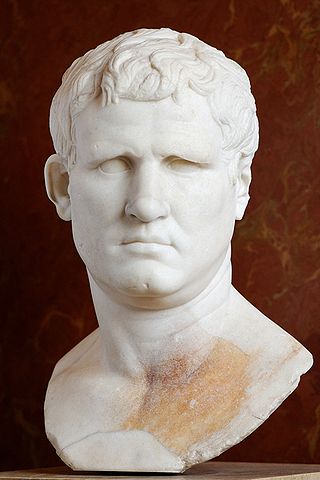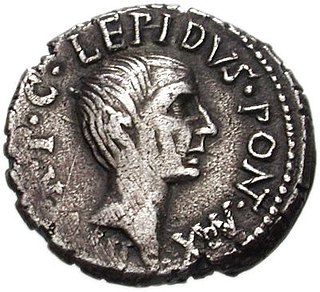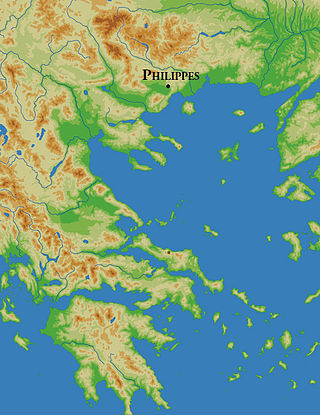Related Research Articles

Gaius Julius Caesar Augustus, also known as Octavian, was the founder of the Roman Empire; he reigned as the first Roman emperor from 27 BC until his death in AD 14. The reign of Augustus initiated an imperial cult as well as an era associated with imperial peace, the Pax Romana or Pax Augusta, in which the Roman world was largely free of armed conflict aside from expansionary wars and the Year of the Four Emperors. The Principate system of imperial rule established by Augustus lasted until the Crisis of the Third Century.

Marcus Vipsanius Agrippa was a Roman general, statesman and architect who was a close friend, son-in-law and lieutenant to the Roman emperor Augustus. Agrippa is well known for his important military victories, notably the Battle of Actium in 31 BC against the forces of Mark Antony and Cleopatra. He was also responsible for the construction of some of the most notable buildings of his era, including the original Pantheon.

Marcus Antonius, commonly known in English as Mark Antony, was a Roman politician and general who played a critical role in the transformation of the Roman Republic from a constitutional republic into the autocratic Roman Empire.

This article concerns the period 49 BC – 40 BC.
Year 40 BC was either a common year starting on Thursday, Friday or Saturday or a leap year starting on Thursday or Friday of the Julian calendar and a common year starting on Friday of the Proleptic Julian calendar. At the time, it was known as the Year of the Consulship of Calvinus and Pollio. The denomination 40 BC for this year has been used since the early medieval period, when the Anno Domini calendar era became the prevalent method in Europe for naming years.

Year 42 BC was either a common year starting on Monday, Tuesday or Wednesday or a leap year starting on Tuesday of the Julian calendar and a common year starting on Tuesday of the Proleptic Julian calendar. At the time, it was known as the Year of the Consulship of Lepidus and Plancus. The denomination 42 BC for this year has been used since the early medieval period, when the Anno Domini calendar era became the prevalent method in Europe for naming years.

The Second Triumvirate was an extraordinary commission and magistracy created for Mark Antony, Lepidus, and Octavian to give them practically absolute power. It was formally constituted by law on 27 November 43 BC with a term of five years; it was renewed in 37 BC for another five years before expiring in 32 BC. Constituted by the lex Titia, the triumvirs were given broad powers to make or repeal legislation, issue judicial punishments without due process or right of appeal, and appoint all other magistrates. The triumvirs also split the Roman world into three sets of provinces.

Marcus Aemilius Lepidus was a Roman general and statesman who formed the Second Triumvirate alongside Octavian and Mark Antony during the final years of the Roman Republic. Lepidus had previously been a close ally of Julius Caesar. He was also the last pontifex maximus before the Roman Empire, and (presumably) the last interrex and magister equitum to hold military command.

The Battle of Philippi was the final battle in the Liberators' civil war between the forces of Mark Antony and Octavian and the leaders of Julius Caesar's assassination, Brutus and Cassius, in 42 BC, at Philippi in Macedonia. The Second Triumvirate declared the civil war ostensibly to avenge Julius Caesar's assassination in 44 BC, but the underlying cause was a long-brewing conflict between the so-called Optimates and the so-called Populares.

Alexander Helios was a Ptolemaic prince and son of Pharaoh Cleopatra VII of the Ptolemaic dynasty and Roman triumvir Mark Antony. Alexander's fraternal twin sister was Cleopatra Selene II. Cleopatra named her son after Alexander the Great. His second name in Ancient Greek means "Sun"; this was the counterpart of his twin sister's second name Selene (Σελήνη), meaning "Moon".
Gaius Asinius Pollio was a Roman soldier, politician, orator, poet, playwright, literary critic, and historian, whose lost contemporaneous history provided much of the material used by the historians Appian and Plutarch. Pollio was most famously a patron of Virgil and a friend of Horace and poems to him were dedicated by both men.

Fulvia was an aristocratic Roman woman who lived during the Late Roman Republic. Fulvia's birth into an important political dynasty facilitated her relationships and, later on, marriages to Publius Clodius Pulcher, Gaius Scribonius Curio, and Mark Antony. All of these men would go on to lead increasingly promising political careers as populares, tribunes, and supporters of Julius Caesar.
Marcus Aemilius Lepidus the Younger or Marcus Aemilius Lepidus Minor was a son of triumvir Marcus Aemilius Lepidus and his wife Junia Secunda, a half-sister of Caesar's assassin Brutus.

Quintus Labienus Parthicus was a Roman general in the Late Republic period. The son of Titus Labienus, he made an alliance with Parthia and invaded the Roman provinces in the eastern Mediterranean which were under the control of Mark Antony. He occupied the Roman province of Syria together with the Parthians in 40 BC. He then pushed into southern Anatolia, still with Parthian support. The main Parthian force took charge of Syria and invaded Judea. Both Labienus and the Parthians were defeated by Publius Ventidius Bassus, who recovered these provinces for Mark Antony.
Publius Servilius Isauricus was a Roman senator who served as consul in 48 BC together with Julius Caesar. He is generally regarded as a puppet of Caesar, having a long friendship with the Dictator.
Gaius Sosius was a Roman general and politician who featured in the wars of the late Republic as a staunch supporter of Mark Antony. Under the latter's patronage he held important state offices and military commands, serving as governor of Syria and leading the expedition to install Herod as king of Judea. Sosius was consul in the year 32 BC, when the Second Triumvirate lapsed and open conflict erupted between the triumvirs Antony and Octavian. Upon taking office, Sosius opposed Octavian in the Senate, for which he was forced to flee Rome.

The Liberators' civil war was started by the Second Triumvirate to avenge Julius Caesar's assassination. The war was fought by the forces of Mark Antony and Octavian against the forces of Caesar's assassins, led by Marcus Junius Brutus and Gaius Cassius Longinus, referred to as the Liberatores. The latter were defeated by the Triumvirs at the Battle of Philippi in October 42 BC, and committed suicide. Brutus committed suicide after the second part of the battle.
Menas, also known as Menodorus, served under Sextus Pompey during the 1st Century BC Roman civil wars.
Marcus Titius was a Roman politician and commander at the end of the Roman Republic.
The Pompeian–Parthian invasion of 40 BC occurred after the Pompeians, backed by the Parthian Empire, had been defeated during the Liberators' civil war by Mark Antony and Octavian.
References
- Friedrich Münzer: Servilius 80. In: Realencyclopädie der Classischen Altertumswissenschaft . Vol. II A,2 (1923), col. 1808–1809.